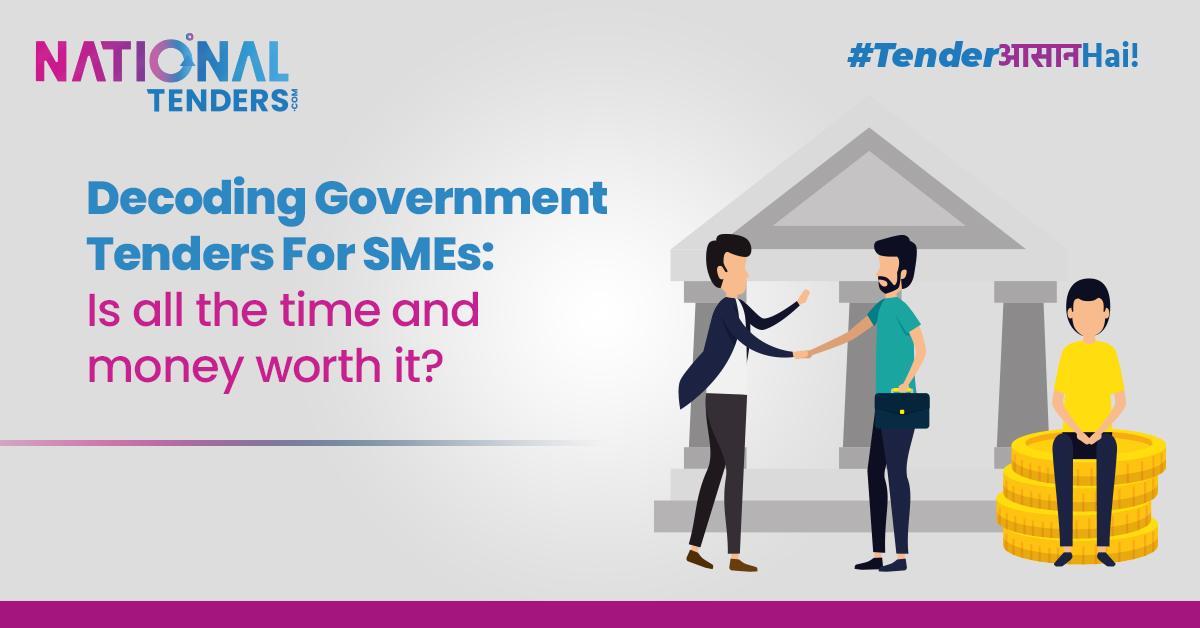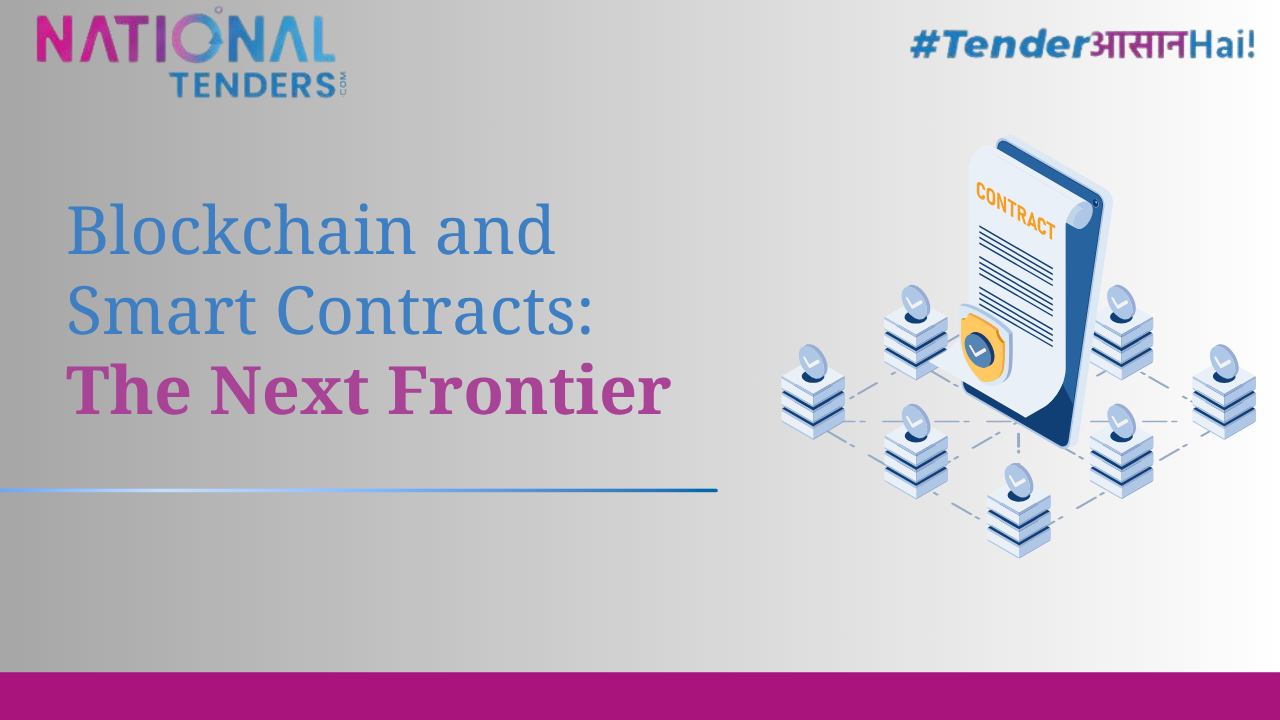- Home
- >
- Blog
OUR BLOG
A collection of stories about our people, our capabilities, our research, and the ever-changing face of our firm.

NationalTenders
Decoding Government Tenders For SMEs: Is all the time and money worth it? | 14 Apr, 2023
Decoding Government Tenders For SMEs: Is all the time and money worth it?
Government procurement can be a great way for small and medium-sized enterprises (SMEs) to grow their business and increase revenue. However, many SMEs are hesitant to take part in the online tender submission process due to the presence of big players already in the game. The major corporations already have established connections and extensive resources, making it challenging for SMEs to compete. This trend can lead to a lack of competitive advantage and limit the potential for innovation and diversity in government contracts.
The government recognizes this issue and has implemented measures to encourage SME participation in eprocurement tender. However, these efforts have not been enough to convince many SMEs to enter the arena. SMEs often lack the knowledge and expertise required to navigate the procurement process, which can also act as a barrier.
India’s MSME Procurement Landscape
India’s MSME procurement landscape has undergone several significant changes in recent years. These changes have been largely driven by the government's focus on promoting the growth of MSMEs and their integration into the mainstream economy. One of the key changes has been the implementation of the Public Procurement Policy for MSMEs, which makes it mandatory for government agencies and public sector enterprises to procure at least 25% of their total annual purchases from MSMEs. This policy has been instrumental in providing a level playing field for MSMEs against larger enterprises in the online tender submission process.
Another important development has been the increasing use of technology in the procurement process. E-procurement tender portals such as Government e-Marketplace (GeM) have been launched to facilitate e-procurement, reduce corruption and promote transparency. This has not only helped MSMEs to participate in tenders but also made it easier for them to navigate the procurement process by reducing paperwork and enabling easy tracking of transactions.
Furthermore, the government has also initiated several schemes to provide financial aid and support to MSMEs. These include the Credit Guarantee Fund Scheme for Micro and Small companies, which provides collateral-free credit to MSMEs, and the Prime Minister's Employment Generation Programme, which aims at generating self-employment opportunities and injecting money into local economies, through setting up of micro-enterprises in the non-farm sector.
Prominent reasons why SMEs fail to win govt tenders?
Winning government tenders really is a big deal for small businesses. However, there are several reasons why tender bidding in the government sector is difficult for SMEs:
- The first and most prominent reason is the less understanding of government tender details and experience in the bidding process. These businesses may not possess the knowledge and skills required to prepare a winning bid, which could lead to a weak proposal that fails to meet the government's expectations.
- Second reason is the absence of proper financial planning. SMEs often submit a bid lower than the expected cost of the project, which might not cover their expenses, resulting in a financial loss.
- Third reason is a lack of resources, including manpower, equipment, and technology, which can result in an inability to meet the necessary requirements for the project.
- Fourthly, SMEs' lack of reputation and credibility may lead to skepticism among government agencies or negative thoughts about the sustainability of the company.
- Finally, SMEs are often unable to provide guarantees or bonds, which are significant requirements for government tenders. Without these securities, SMEs are viewed as high-risk suppliers, resulting in their bid's disqualification.
Ultimately, they can overcome these challenges with the right preparation and external support, such as partnering with more established firms, seeking consultancy services, or investing in training and development programs.
Steps taken by the government to promote SME participation in the public procurement system
To boost the involvement of small and medium-sized enterprises in government contracts, the administration has introduced numerous policies. By implementing a transparent procurement procedure and value-for-money policy, SMEs can easily access various opportunities within public procurement that account for a significant portion of the country's GDP. In India, an aggregate of over 75,000 government tenders are released monthly - including both central and state government tenders. Over 7,000 government institutions release tender notifications each day, providing a wide range of opportunities for micro bidders. Government contracts contribute approximately 10% to the nation's Gross Domestic Product (GDP).
Additionally, the government has also provided financing and technical assistance to SMEs to help them meet the requirements of the government procurement process. To keep the government tender details transparent and easily understandable, Govt has launched e-portals. The creation of a centralized portal has made it easier for small and medium business owners to access information and bid for government projects. Governments have also simplified procurement procedures and reduced the bureaucracy involved in the process to make it more accessible to small businesses. Through these efforts, government authorities hope to create a level playing field for micro bidders and promote their participation in government procurement, driving economic growth and job creation.
Ensuring Value for Money and Time with Public Procurement: A Guide for SME
Before diving into government tender bidding, small business owners must first evaluate if it is worth investing their time and money. There are certain checkpoints that SME owners can keep in mind to make an informed decision:
Evaluation
Firstly, make sure that the government tender is meant for your SME, and that its specifications and requirements are a good fit for your business. Then, sort and pick the relevant tenders that suit your expertise, resources, and capacity. While some tenders may be open to all businesses, some may require specific certifications or large companies. So, before investing any resources into the tender process, ensure that your business is eligible to participate.
Calculation
Next, decide the average tender value of the contract you want to bid for and ensure that it aligns with your budget and pricing strategy. Consider the cost of raw materials, labor, overheads, and other expenses, and make sure that the potential revenue justifies the investment. Consider your SME's financial bandwidth and whether the investment in tender bidding for the contract aligns with your business strategy.
Competition
Moreover, research the market demand and competition for the tender, and estimate your chances of winning the contract. If the competition is too stiff, or the potential profit margins are too low, it may be better to invest your resources in other business opportunities.
Collaboration
Collaborating with another MSME to meet several eligibility requirements of various government tenders can help you get a lucrative government project.
Cost Estimation
Finally, find out the cost of preparing the proposal based on the complete government tender document details including the time, effort, and resources required for documentation, compliance, and compliance. Ensure that the expenses are within your budget and that you can deliver the proposal within the deadline. This will help you evaluate whether the cost of preparing the proposal justifies the potential returns from the contract.
By following these checklist points, you can make an informed decision about whether a government tender is worth your SME's time and money. Remember, winning a contract is not just about the revenue but also about the long-term growth, reputation, and sustainability of your business.
If you want to do a hassle-free process of finding the most suitable tender for your business, approach experts like National Tenders. It is an e-procurement tender portal having a team of experts who will connect with you and help you find the best project according to the size, turnover, and type of your business. They will not only help you keep track of the eligibility requirements, procurement benefits, and other government tender details but will also help you in the online tender submission process. Hire the experts and experience the smooth journey of participating in government tenders.
 How E-Tendering is Transforming the Tender System in India
How E-Tendering is Transforming the Tender System in India Building Strong Vendor Partnerships in the Tender Ecosystem
Building Strong Vendor Partnerships in the Tender Ecosystem Unlocking Big Savings Through Smart Tender Strategies
Unlocking Big Savings Through Smart Tender Strategies How Generative AI Is Disrupting Tendering in 2025
How Generative AI Is Disrupting Tendering in 2025 Blockchain and Smart Contracts: The Next Frontier in Public Procurement
Blockchain and Smart Contracts: The Next Frontier in Public Procurement
SUBSCRIBE NOW
Kindly fill up the form